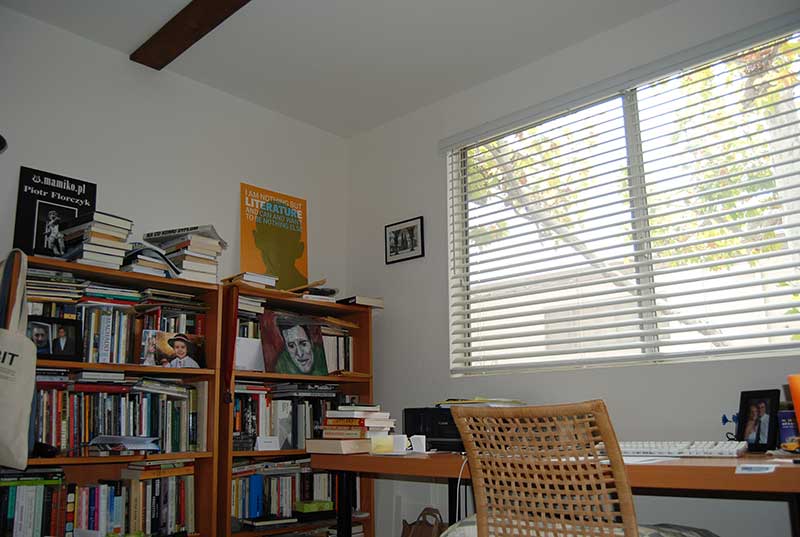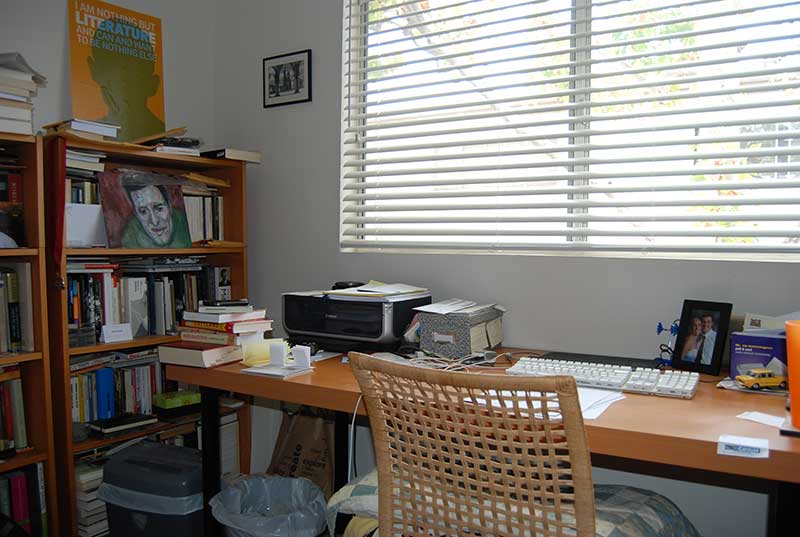Tabula Rasa
While staring at the paper on his writing desk, the author wonders whether he’s building a new Tower of Babel.
There is a poem I know, by a poet who shall remain unnamed, in which the poet engages in a dialogue with a blank sheet of paper lying on a table before him. He calls the page all the right things, like “beautiful” and “kind” and “sexy.” The page says nothing. When he touches it with his hands, it doesn’t respond, but nor does it recoil in disgust. When he lowers his head, it doesn’t mock him. He bows for so long that eventually his head falls hard onto the kitchen table. He’s in pain, but from up close he gets to see the imperfections in the page—small flecks of discoloration, tiny wrinkles—and momentarily his failure to sweep the page off its feet with his words doesn’t bother him. In time, aware that it no longer holds all the cards, the page invites the poet to “come in.” I’m about to wake up from my nap, it tells him—why don’t you make yourself at home? What a mésalliance! The poet, meanwhile, tired of courting the page, calls the page’s bluff and withdraws. From this point on, their relationship can’t even be called platonic; rather, it’s business as usual.
My vocabulary is housed in an hourglass I keep turning over. Oh, how I wish it tipped onto its side and cracked open, spilling its contents; I could sort and sieve through the words at will, rather than having to hunt for the right one while it tries to slip away through the narrowing.
The cat-and-mouse-like game is no secret to any writing artist. More often than I care to admit, I hear myself stuttering when I try to form a sentence. Even now, while I’m writing down these words, I feel like I’m about to run dry. Every word may be my last, and I don’t mean that lightly, knowing well that some day, hopefully in the distant future, I will indeed utter my final word—what will it be? Meanwhile, my vocabulary is housed in an hourglass I keep turning over. Oh, how I wish it tipped onto its side and cracked open, spilling its contents; I could sort and sieve through the words at will, rather than having to hunt for the right one while it tries to slip away through the narrowing. Eating good food helps, as does going out for a swim, not in the blue-green Pacific, where the water’s cold for most of the year, but in a chlorinated pool. Bouncing off the walls and following the black line on the bottom takes the edge off, though it doesn’t make it easier to articulate what I feel after I escape death at the hands—or feet—of an overweight kid who’s just cannon-balled into the pool.
There is always drink, I suppose, to help one unloosen his tongue, but who wants to drink by himself? I don’t. Porn works from time to time, I hear, but I’m married, and straight as an arrow. My neighbor, on the other hand, the one with whom I share a wall, is rather promiscuous, meaning, he plays all kinds of music. His preferred tool of expression is an acoustic guitar. But instead of gently finger-plucking some Bach to the benefit of everyone around, he practices the same three power chords time and again. Like most walls that alter the landscape of their surroundings, our wall both divides and unites us, for I have no choice than to listen to him play the guitar, which is actually a lot more acceptable than when he plays stuff on his computer. We’re talking about everything from elevator music to African drumbeats—a true cacophony of spirits. Sometimes, when I lack the right words to express my disapproval, I just bang my fist on the wall.
Perhaps it’s a good thing that I get so little done. Unable to articulate half of what I feel and think, I bring back memories in hopes of populating my present with something that might eventually connect it to my past. In fact, one story does repeat itself. I’m six or seven years old. I wear a flannel plaid shirt and extremely short shorts. I’m inside our family’s apartment, which is small, with only one room, a bathroom, and a kitchen. I’ve taken some leftover pieces of plywood, which my dad had bought to build a new wardrobe for the hallway, and use them to erect an elaborate system of highways that stretch from the coffee table to the armchair and from the fold-up bed to the TV stand. My Matchbox cars love speed. I play for fun, sure, but also to help get people where they need to be; my miniature soldiers in particular go from one battle to another. Eventually, the living room comes to resemble a giant construction zone. Makeshift churches are built, as well as shops that offer every imaginable good. My parents like that I can entertain myself. Then, one afternoon, I trip, fall, and chip half of my front tooth. To preserve the enamel, we place it in a jar of milk. When, later, we try to reattach the piece, we can’t find the right fit.
Thank god this page had already been dirtied by the time I sat down to write on it. The few sentences among twice as many doodles remind me that I’ve been here before. Placing one word next to another, and then adding some more in between, I see them as Lego blocks that are meant to click-snap together. If all I’m doing is building a new Tower of Babel, well, so be it—among the languages I speak, Polish and English will always end up at the top. In the meantime, it’s quarter after three p.m., Thursday afternoon. My wife will be home in less than three hours. We’ll have dinner together—I’ll have to cook it first; how does Mexican food sound?—then watch some television. I’m not doing so well, am I? We’ll go to sleep around ten. I’ll pee at least once in the middle of the night. Will we dream? I don’t know.
Santa Monica, California













